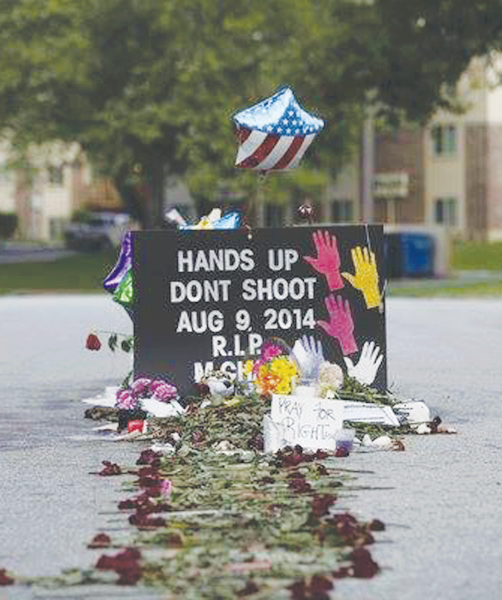
Minutes after the grand jury’s decision was announced, members of the Ferris Black Student Union and NAACP worked to quickly organize the event for the following morning through social media. They planned the rally for 11 am on Nov. 25.
Ferris television and digital media production senior and President of the Black Student Union Anthony Brock of Detroit said, “I organized a peaceful rally to get students of all races to come get informed of the issues and voice their opinions on the matter.”
Students gathered at 11 a.m. for a long moment of silence and then read aloud a letter written to Ferris State University President David Eisler that “spelled out the frustrations of the black population here at Ferris,” according to Brock.
Peaceful gatherings were held across the country and on college campuses including CMU, Michigan State and Grand Valley. Brock stressed that efforts on social media are not enough and that a public display is more effective.
“It’s very important to do something on campus because we face the same iniquities here at FSU,” Brock said. “What’s lacking from this entire situation is compassion for all parties involved. The underlying tension is hateful.”
Breia Harris, President of Ferris’ NAACP chapter, said that a divisive issue like Ferguson should bring students together and not pit them against each other.
“We have diversity at Ferris statistically, but not realistically,” Harris said. “College is supposed to be a learning experience and one part of that is learning who is sitting next to you in class.”
Harris and Brock spoke of racial slurs posted to the anonymous social media platform Yik Yak after the Ferguson news broke.
“It’s scary, because I really go to school with students who feel this way. Then the worst thing is it’s anonymous so I could be sitting next to the person that wrote it,” Harris said.
Brock said that the posts to Yik Yak were “foul and very eye-opening. It’s impossible for us to overcome the stereotypes placed on us if those who judge don’t give us a fair chance or clean slate.”
One aspect of the Ferguson outcome is push for police officers to wear body cameras while on duty. As the media and the internet continue debating the grand jury’s decision, body camera legislation is being drafted in several states, including Michigan.
A statement released by Michael Brown’s family includes a call to action: “Join us in our campaigns to ensure that every police officer working the streets in this country wears a body camera.”
Ferris criminal justice junior John Hill of Owosso is open to the idea.
“If officers were to wear cameras on their vests, it would help with the he-said/she-said cases,” Hill said. “I would be comfortable with wearing a camera, because I would have nothing to hide. People may call it a privacy infringement, but I call it a necessary tool to protect both police and civilians.”
The Brown family’s statement continued: “We respectfully ask that you please keep your protests peaceful. Answering violence with violence is not the appropriate reaction.”
